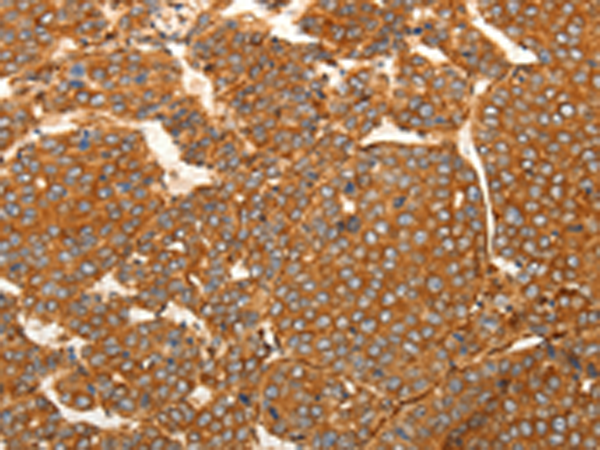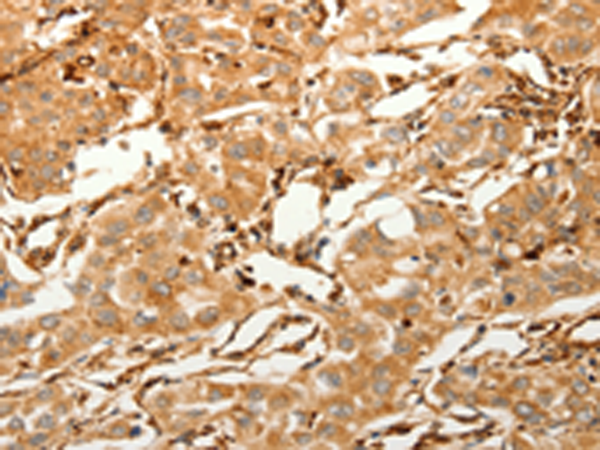

| WB | 咨询技术 | Human,Mouse,Rat |
| IF | 咨询技术 | Human,Mouse,Rat |
| IHC | 1/100-1/300 | Human,Mouse,Rat |
| ICC | 技术咨询 | Human,Mouse,Rat |
| FCM | 咨询技术 | Human,Mouse,Rat |
| Elisa | 1/2000-1/10000 | Human,Mouse,Rat |
| Aliases | FRP; FRP1; FrzA; FRP-1; SARP2 |
| Host/Isotype | Rabbit IgG |
| Antibody Type | Primary antibody |
| Storage | Store at 4°C short term. Aliquot and store at -20°C long term. Avoid freeze/thaw cycles. |
| Species Reactivity | Human, Mouse |
| Immunogen | Synthetic peptide of human SFRP1 |
| Formulation | Purified antibody in PBS with 0.05% sodium azide and 50% glycerol. |
+ +
以下是关于SFRP1抗体的3篇参考文献,按研究领域分类简要概括:
1. **标题**:*Epigenetic silencing of SFRP1 in colorectal cancer via promoter methylation*
**作者**:Suzuki H, et al.
**摘要**:研究结直肠癌中SFRP1基因启动子甲基化导致表达沉默,通过SFRP1抗体验证蛋白表达缺失,揭示其与Wnt通路异常激活的关联。
2. **标题**:*SFRP1 suppresses osteosarcoma progression by modulating Wnt/β-catenin signaling*
**作者**:Zhang Y, et al.
**摘要**:探讨SFRP1在骨肉瘤中的抑癌作用,使用SFRP1抗体检测肿瘤组织表达水平,证实其过表达可抑制Wnt通路并减缓肿瘤生长。
3. **标题**:*SFRP1 as a potential biomarker in atherosclerosis: Role in vascular calcification*
**作者**:Shiode N, et al.
**摘要**:分析动脉粥样硬化中SFRP1与血管钙化的关系,通过免疫组化(SFRP1抗体)发现其表达降低与钙化程度负相关,提示其调控作用。
---
**备注**:以上文献可通过PubMed或期刊官网(如*Cancer Research*、*Oncotarget*等)检索原文。若需更多近期研究,建议补充关键词如“SFRP1 antibody application”进一步筛选。
The SFRP1 (Secreted Frizzled-Related Protein 1) antibody is a tool used to detect and study the SFRP1 protein, a member of the SFRP family that modulates Wnt signaling pathways. SFRP1 acts as an extracellular antagonist of Wnt proteins by binding to Wnt ligands or Frizzled receptors via its cysteine-rich domain (CRD), thereby inhibiting Wnt-receptor interactions. This regulation is critical for embryonic development, tissue homeostasis, and stem cell maintenance. Dysregulation of SFRP1 is implicated in various diseases, particularly cancer. Epigenetic silencing of the SFRP1 gene via promoter hypermethylation is frequently observed in cancers like colorectal, breast, and gastric carcinomas, contributing to unchecked Wnt pathway activation and tumor progression.
The SFRP1 antibody is widely used in research to assess protein expression levels in tissues or cell lines using techniques like immunohistochemistry (IHC), Western blot (WB), or ELISA. It helps identify SFRP1 loss in tumors, correlates findings with clinical outcomes, and explores its role as a tumor suppressor or potential biomarker. Additionally, it aids in studying SFRP1's involvement in non-cancerous conditions, including osteoporosis and cardiovascular diseases. Commercial SFRP1 antibodies are typically validated for specificity and sensitivity, though variations may exist depending on epitope targets (e.g., N-terminal vs. C-terminal regions). Its utility spans basic research, diagnostic assays, and therapeutic development targeting Wnt signaling.
×